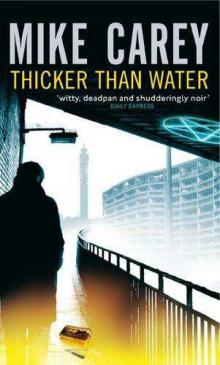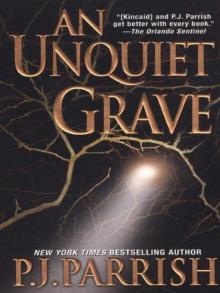- Home
- P J Parrish
The Damage Done Page 2
The Damage Done Read online
Page 2
As he took a step back to get a better look at the window, Louis saw that it depicted Jesus surrounded by a cluster of men in robes and beards. The apostles, he guessed. The cold breeze was coming from the man kneeling at Jesus’s feet—it was the missing pane. The guy had no face.
A door banged shut and Louis turned to the front door, expecting Steele or one of the other unit members. But it was a workman carrying a power tool. Two other workers drifted in, carrying boxes emblazoned with the word DELL. They gave Louis a quick glance before splitting off and disappearing beneath the desks.
Louis moved to a desk to look at one of the computers. They were alien to him. He realized that being out of law enforcement for so long, he was already miles behind whatever technology the state of Michigan was probably using. Hell, he wasn’t even sure he could figure out how to run his own wants and warrants checks. His best friend back in Florida, Mel Landeta, had something called a MacIntosh, and Louis had meant to ask for a tutorial. But after that first phone call from Steele’s aide, Camille Gaudaire, there had been no time.
Camille had told him that there would be some follow-up interviews and paperwork, then she gave him some concise marching orders: He had to get in top physical shape. He had to qualify on handgun, long rifle, assault rifle and shotgun. He had to familiarize himself with Michigan’s most infamous unsolved homicides. Then Camille laid out the kicker.
You must attain a rudimentary knowledge of a foreign language. The captain knows you took French in college. He expects you to become fluent as quickly as possible.
Louis didn’t ask why. He just got to work. For the next three months, he worked his ass off. Pumped iron in Fort Myers gyms until he couldn’t make a fist. Tried to memorize the Michigan State Police policy and procedures manual. Faxed Camille the results of his physical and his firing range scores. Took a French adult ed course and fell asleep each night to the singsong sound of a strange woman conjugating verbs. He also read every book and article he could find on Michigan homicides, never sure he had the right ones, or if he was learning from them what Steele expected him to learn. And he turned down the offer he had with the Lee County Sheriff’s Office, giving up a sure thing for this flyer of a job, so he could be just hours away from Lily and Joe.
Ils aiment. Nous aimons. Vous aimes. J’aimes
They love. We love. You love
I love...
A sharp whirring noise made Louis start. The guy with the power tool was crouched atop the conference table and was drilling holes in the center. When he paused to adjust his safety glasses, he saw Louis and gave him a twisted smile.
“Never had to run phone lines in a church before,” he said. He made the sign of the cross over his sweatshirt and went back to his drilling.
From somewhere deep in the bowels of the church came the sound of hammering. Every time it stopped, Louis could hear the wheeze of the wind through the pipe organ up in the choir loft.
The banging of the front door closing made Louis turn.
The man standing at the entrance was big—at least six-foot-seven. He had a bald bullet head that stuck out of his worn, black leather bomber jacket, and meaty, bowed legs that were encased in faded, black jeans. As he came forward, the man took off his mirrored sunglasses, revealing two white patches pinpricked with small, bloodshot blue eyes.
The guy had to be a member of the unit, but he looked like he had just gotten off a three-day bender at Daytona Bike Week.
He came forward and gave Louis a once over, and for a second Louis saw himself in the man’s eyes—new blue blazer, slacks, tie, and white shirt so fresh from the dry cleaners it still had creases down the front.
The guy took an unlit cigarillo stub from his mouth and smiled, revealing big movie-star teeth. “You with the task force?” he asked.
“Yeah,” Louis answered. He stuck out his hand. “Louis Kincaid.”
“Cam Bragin.”
The guy had a vice-grip. When he let go, Louis resisted the urge to shake the blood back into his hand. But he did take a step back to distance himself from the burnt-cherry smell of the cigarillo.
The front doors banged open again. A large woman with wild gray hair, carrying a briefcase and wearing a bright red cape, paused just inside, her eyes wandering up over the beams and windows. With a flourish, she flung off her cape.
A man appeared behind her, as if by the magic of her cape’s movement—short, wiry, dark floppy hair, and black-rimmed glasses. He wore baggy khakis and a green windbreaker. There was a huge mail pouch slung over his concave chest.
Before either of them could say hello, Louis heard the echo of footsteps somewhere high above and looked up to the choir loft.
Mark Steele was leaning on the railing, gazing down at them. Then he disappeared from view and reappeared on the spiral staircase that curled down to the nave. Steele was dressed all in black—open-collar shirt, trousers. All eyes were on Steele as he came up to the conference table. Even the guy running the phone lines had stopped his drilling to stare.
“Can you work somewhere else for a while?” Steele asked the man.
“It’s your dime. I’m on triple overtime and need a smoke,” the phone man said as he headed toward the door. As if by heavenly decree, all other banging and clanging in the church stopped.
Steele was holding a small cardboard box, the same one he had brought in the first time Louis had seen him. He set it down on the conference table. “Please, all of you take a seat,” he said.
Louis took the chair closest to Steele. Cam sat down next to him and the two others grabbed chairs on the far side. The woman had a difficult time arranging her cape and briefcase in her chair and Steele waited, but not without a glimmer of annoyance.
“We have two people who have not arrived,” Steele began. “Our fifth team member will be coming to us from the FBI, area of expertise: psychology and profiling.”
A sharp clang made Steele stop. His eyes shot to a worker who was picking a wrench off the stone floor. Steele waited until the man had disappeared before he went on.
“The second person you have all talked to by phone,” Steele said. “She is Camille Gaudaire, my sénéchal.” He surveyed the blank faces before he looked at Louis. “Translation?”
He didn’t know the word sénéchal, so he decided to guess. “Assistant?”
“Close but not quite right. She is my consigliere and will be your coordinator and chief contact.”
Steele turned to his left. “First, let me introduce you to each other. This is Cameron Bragin. After serving his country, Cam went into police work in Chicago, distinguishing himself in undercover work. He’s been ass-deep in narcotics, gun trafficking, prostitution, organized crime—everything on the criminal menu—but has never once been made. So, if you need undercover infiltration, male or female, he’s your man. Or woman, if you will.”
Louis couldn’t help but think that any perp who took Cam Bragin for a woman had to be blind.
Steele said something to Cam in what sounded like Russian or Polish. Cam replied with a chuckle.
“Next up is Junia Cruz,” Steele said, turning to the other side of the table. “Junia’s from the City of Angels, where she has discovered there are few. She’s an expert in cutting edge crime scene investigations, forensics, blood spatter, and bullet trajectory. She has significant contacts in the most advanced labs and universities in the country, so use her.”
Steele paused for a second, as if trying to remember something, then spoke to Junia in Spanish. “Los muertos siempre dicen la verdad, no?”
“Si,” Junia said with a smile.
Steele gave a nod to the small, dark-haired man. “Sanjay Thukkiandi. He likes to be called Tooki. He brings with him six years as an investigator in Madras, India, and three years as the FBI’s leading computer tech expert. But maybe the best way to introduce Tooki is to quote something he told Camille during his interview. ‘Like my computers, I am a complex machine, built of spare parts from the Madras gutters, the bow
els of the FBI and the trash cans of Microsoft.’”
Tooki’s cheeks reddened and he lowered his head.
Steele went on. “Tooki is not only an investigator in his own right, he is our technology expert. If the information you need is on a database somewhere in this country, he can find it for you. He’ll also be working on linking us up to NCIC, VICAP, the new AFIS network, and as they go live, other databases that will allow us to search shoe and tire tread prints. I would welcome Tooki in what I have been told is Tamil, but that is one language I am still learning.”
“Don’t bother, Captain,” Tooki said. “We’ve so bastardized it where I come from, I’m not sure I would understand proper Tamil anymore. Plain English is fine with me.”
Steele gave him a smile. Louis suspected Steele would try to learn the language anyway, just to prove he could.
Steele’s eyes moved to Louis. “Louis Kincaid,” he said. “Criminology degree from University of Michigan, ex-cop, ex-detective, lionized in multiple law publications as Florida’s premier private eye and the captor of Florida’s Paint it Black serial killer.”
Louis wondered if the edge he heard in Steele’s voice was ridicule or respect for the tabloid notoriety Louis had gained.
“Louis has been studying to become our in-house expert on unsolved Michigan homicides,” Steele said. He paused with the barest of smiles and added, “Louis has exceptional instincts and a special feel for unsolved cases that you will all come to appreciate.”
Louis held Steele’s hard brown eyes, not happy with the description of his résumé. It made his past sound sensational and his investigative skills almost paranormal. That’s the last thing he needed with this group—to be tagged as some sort of celebrity mystic who dug through dusty folders.
“Louis,” Steele said, “bienvenue chez toi.”
Welcome home? Louis was so surprised it took him a moment to answer. “It’s good to be back,” he said.
“Now, as I told all of you, this task force will be focusing on Michigan’s unsolved homicide cases,” Steele said. “I have loosely modeled it after one of the first squads of this type, a three-man team formed in Miami eight years ago to solve the old murder of a young girl. A local reporter dubbed them the Cold Case Squad and the name stuck.”
Louis had a vague memory of hearing about this squad at one point. His lover, Joe, had worked for Miami PD—had she mentioned it?
“As you may have guessed, I have a special affection for unsolved cases,” Steele said. “I fought hard not only to establish this unit, but to get the funding and equipment we will need to be successful.”
Steele’s eyes moved around the faces at the table, holding the moment on edge as skillfully as anyone Louis had ever met. Even the wind was still.
“I am a believer in the power of justice,” Steele continued. “Not because it brings closure to the families, because it can’t. And not because it allows us, as a society, to get revenge by incarcerating the offender for the rest of his life because, as we all know, for many prison is not the hell we wish it was.”
Steele took a deep breath.
“I believe in justice because it restores a balance,” he said. “Not only in the broad philosophical sense of the way our world is supposed to work, but more importantly, in each of you. And you, above all others, need that balance. Do you all understand?”
Someone murmured a yes. Louis looked down at his leather folder, his thoughts drawn back to a PI case he worked in Florida, where the need to catch a killer had compelled him to not only beat the shit out of the man, but to bury a piece of evidence in order to send him off to jail.
“To paraphrase Malcom X,” Steele said, “our mission first is truth, no matter what it is, and then justice, no matter who it is for or against.”
Louis was still back in Florida, remembering. Although he hadn’t recognized it at the time, he had sought this balance Steele talked about because he had thought seeing the killer in jail would bring him that. But it had brought him nothing because in what he had done, there had been no truth. In the end, he had returned the evidence anonymously to the local PD.
“Now that we have all that out of the way, let’s get down to basics,” Steele said. “You will all be issued a new Michigan-blue Ford Explorer, equipped with video cameras, shotguns, rifles and a long-range state of the art radio that will allow you to communicate with the sénéchal from almost anywhere in the lower peninsula. The radio will also come with pre-set frequencies that will allow you to communicate with most major agencies in the state.”
“Sweet,” Cam said softly.
“In order to travel as cases dictate, you will all have a go-bag with you at all times,” Steele went on. “You will also each receive a pager and a cellular telephone. These phones are high-tech experimental models designed to work with radio frequencies and should give you service anywhere your radio works. But they are not a hundred percent reliable, so please keep that in mind when you are working in a desolate area.”
Louis saw Tooki nodding.
“They’re also expensive to operate,” Steele said. “Excessive charges will be taken out of your paycheck. And don’t lose them. That cost, too, will be deducted from your check.”
Louis lowered his head to hide his smile. For the first time in years, he was going to have a regular paycheck and it was going to be big. If he decided to impress his daughter Lily by calling her on the damn phone at least now he could afford it.
“In general, your schedule will be dictated by your work load,” Steele said. “Even though you are all salaried, you will log your hours and travel expenses with the sénéchal. I expect a six-day workweek, no less than ten hours a day. We are converting the basement here to bunk rooms and there is a full kitchen, so when the work dictates that I need you here together, at least you will be comfortable.”
Steele reached into his box and retrieved a thick blue binder Louis recognized as the procedure manual.
“You’ve all read this by now, I’m sure,” Steele said. “Make sure you know the rules but keep in mind, in the end, at any given moment, you will be the one who makes those instant decisions we all face from time to time. Exigent circumstances, use of force, how far and how hard to push a suspect.”
The room was quiet, except for the whistle of the wind through the broken pane in the stained glass window.
“Be aggressive but be smart,” Steele said, “because the first time your reckless decision costs us an innocent life, gets a case thrown out of court, or brings unnecessary shit raining down, you’re finished. Not just with me, but in the entire state. Are we clear?”
Louis looked away. In other words, exile.
When no one said anything, Steele went on. “One more thing before you get your first assignments.”
Steele opened the cardboard box and withdrew a handful of black leather wallets. “Your credentials,” he said.
One by one, he checked the name on the inside then slid the wallet across the table to its owner.
Louis opened his wallet. On one side was his ID card, the photo taken a few weeks ago on one of his trips up from Florida for new-hire processing. His eyes moved down the type. Louis W. Kincaid, Detective, State of Michigan.
On the other side of the fold was a gold shield cushioned in black leather. An embossed eagle sat atop the MSP emblem of two elk on their hind legs, bookending a man holding a flag. Under that were the words: si quaeris peninsulam amoenam circumspice.
He could still remember the translation of the state motto from his police academy days: If you seek a beautiful peninsula, look about you.
There was a lone word in the middle of the badge—TUEBOR.
I will defend.
“When you’re all done admiring your gold, I’ll ask you all to stand up and raise your right hand.”
The sound of chairs scraping across the stone floor filled the nave.
Steele opened a small black notebook. “Repeat after me. I . . . do solemnly swear . . .”
“That I will faithfully discharge the duties of an officer of the Michigan State police . . .”
Louis looked around the table. Everyone had the same expression—restrained excitement and pride.
“With the authority invested in me,” Steele said, “I appoint you detectives of the department of Michigan State Police. Congratulations.”
Louis sat down, his eyes moving back to his badge. Then he closed the wallet and looked back at Steele.
“Our first couple cases will come directly from the state’s attorney general and his office is currently reviewing requests from local agencies,” Steele said. “So, to keep you busy, I have selected unsolved cases for you to work on. Consider these cases a getting-your-feet-wet process. You’re not being tested, but you will be studied. What I want to see is how your mind works, how you utilize your tools, your skills and those of your partners. This process will help solidify you as a team.”
Steele went up to the altar, dragged the large, green chalkboard to the center and flipped the board over. On the other side were five large photographs. Above each was a case number and a brief description written in chalk.
The Dumpster Hookers 1988.
CMU Death Ring. Suicides/homicides? 1990.
Palmer Park Wolf Pack murders 1985.
The Bay City Black Widow. 1989.
Boys in the Box. Copper Harbor. Found 1979. Died?
Junia was the first to get up and go up to the altar for a closer look. Cam and Tooki followed. Louis joined them, standing at the bottom of the stairs, eyeing the photos.
They were grainy blow-ups, obviously taken from case files. The bloodied nude body of a woman lying next to a garbage bin. A young man hanging in a shower stall. A battered body sprawled in a field of wild flowers. A whale-like bloated body on a rocky beach.

 South of Hell (Louis Kincaid Mysteries)
South of Hell (Louis Kincaid Mysteries) Thicker Than Water
Thicker Than Water Dead of Winter
Dead of Winter The Damage Done
The Damage Done South Of Hell lk-9
South Of Hell lk-9 A Killing Rain
A Killing Rain Dead of Winter lk-2
Dead of Winter lk-2 Island of Bones
Island of Bones Paint It Black
Paint It Black An Unquiet Grave (Louis Kincaid Mysteries)
An Unquiet Grave (Louis Kincaid Mysteries) She's Not There
She's Not There